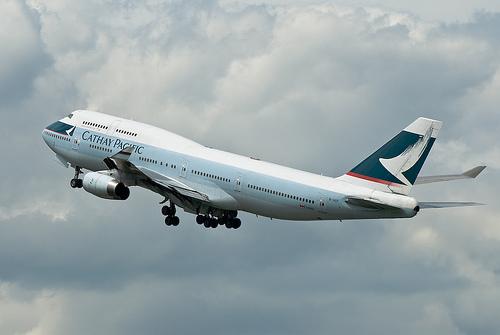
Fuel cost exceeded Cathay Pacific budget for 2012 by $2.5bn
Here's an open letter from Cathay Pacific CEO.
The article below by the chief executive of Cathay Pacific John Slosar is being published in CX World, which is distributed to employees of Cathay Pacific and its subsidiaries.
“Recently, I was asked - with flights seemingly so full why did we lose money in the first half and are we doing better now? It’s a sensible question - one that I expect many of you wonder about as well - so I wanted to use this opportunity to share with everyone my answer.
In the simplest terms, there are cost and revenue factors which have combined to make 2012 a difficult year. Let me explain further.
On the cost side, the biggest issue is fuel. Fuel is our single largest cost.
We planned for fuel to be expensive this year, but it has been even more expensive than we anticipated. The actual cost of fuel into plane - because we have to pay more for aviation fuel than the cost of the crude oil you see reported in the newspaper - has exceeded budget by about 6%.
Now, 6% may not seem like much but, looking at all our flights together on an annual basis, if we had done nothing, this higher fuel price would have meant our total fuel bill this year would have exceeded the high budget we had planned by HK$2.5 billion!
The increase in the price of fuel since 2010 has had a big impact on the operating cost of our routes. On a 747-400 flight to London, fuel today represents 62.5% of the total cost of the flight. In 2010, when fuel was substantially lower, it represented only 47.9%. That is a big jump! Let me try to put that into perspective. Taken over a year on that one flight pair alone, the fuel bill will have increased by HK$110 million -- again, on just this one flight pair.
To directly address the fuel situation, we have limited options. We can and do hedge, but hedging is not a miracle solution, particularly when fuel prices have been stubbornly high for so long. Hedging is like an insurance policy - which like every other insurance policy costs money to buy - and so it offers some protection, but it doesn’t remove all of the risk.
We can try to raise ticket prices, but this is extremely difficult to do in the current weak economic environment.
We are allowed to collect fuel surcharges, but these require regulatory approval and help us recover only about 50% of the extra fuel cost we pay. So this also helps, but cannot fill the gap.
Finally, we can take steps to reduce fuel consumption and this is where we have been most aggressive. Retiring the 747-400s from our fleet more quickly and replacing them with fuel efficient 777-300ERs will help us tremendously. The 777s are overall more than 20% more fuel efficient than the 747-400s. As we move into 2013 and take delivery of more 777-300ERs, we’ll see an even bigger benefit but the full benefit will
not be realized until 2014.
The cost issue, however, encompasses more than just fuel. There is significant cost pressure all around us. We are seeing increases in airport charges, overflight charges, catering charges, landing and parking charges, handling charges and passenger costs to name a few. So we must tackle our cost base where we can. Our Chief Operating Officer Ivan Chu is leading these efforts.
Turning to the revenue side, cargo has been a huge challenge. Not just in 2012, but for most of 2011 as well. Cargo has always been important to CX. In good years, cargo can be almost 30% of our total revenue although the result for 2012 will be well below that. 2010 was a boom year for cargo, but a weaker world economy changed all that and not for the better.
Cargo volumes track the health of the world economy - a weak economy means lower cargo demand. Faced with this situation in 2012, we have cancelled freighter flights and we have also parked some of our freighters. But cargo doesn’t only travel on freighters.
Invisible to most customers, but not to our bottom line, cargo also travels in the bellies of our passenger aircraft. Cargo volumes in our passenger aircraft year-to-date are below budget and overall cargo revenue this year is lower than 2011 by around 13%.
Inside our passenger cabins, loads have been good. Not as good as in 2010 when the load factor averaged 83.4% or even in 2011 when it was 80.4%, but certainly quite good at 80.2% through October. Still, you can see that we have a lost a little bit here.
























 Advertise
Advertise










